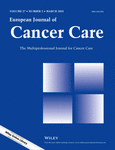Cancer prevention—the feasibility and acceptability of promoting breast cancer risk reduction in the screening setting through a lifestyle magazine
Funding information
The study was funded by the Scottish Government's Detect Cancer Early programme to the Scottish Cancer Foundation (http://scottishcancerfoundation.org.uk/)
Abstract
Cancer prevention and early detection strategies are fundamental to reducing breast cancer burden. Offering prevention guidance on modifiable risk factors within early detection settings is rare. We aimed to evaluate the acceptability of a magazine focused on lifestyle and cancer prevention for use in breast screening clinics. A lifestyle magazine was developed and distributed within two breast screening settings in the West of Scotland over a 2-month period. Women were either offered the magazine on arrival or in a self-service format. Uptake was recorded by NHS staff. Women's views were sought via an evaluation questionnaire. Staff were interviewed on their experiences of intervention delivery. Uptake was greatest when offered to attendees (95% vs. 20% self-service). The evaluation questionnaire response rate was 17.3%. Almost 60% of respondents reported an increased knowledge about breast cancer and lifestyle and felt motivated to find out more about cancer prevention and 40% expressed intentions to make lifestyle changes. Over 90% of respondents thought lifestyle factors were important in breast cancer prevention. Staff feedback was positive, indicating no detrimental effects on workloads. In conclusion, a cancer prevention lifestyle magazine can be successfully delivered in the breast screening setting and deserves further exploration for roll out.




